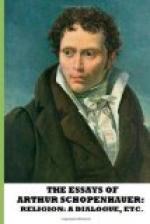that very few will be found righteous and attain salvation,
and that only in consequence of the gift of grace,
and because they are predestined to be saved; whilst
the remainder will be overwhelmed by the perdition
they have deserved,
viz., eternal torment in
hell. Taken in its ordinary meaning, the dogma
is revolting, for it comes to this: it condemns
a man, who may be, perhaps, scarcely twenty years
of age, to expiate his errors, or even his unbelief,
in everlasting torment; nay, more, it makes this almost
universal damnation the natural effect of original
sin, and therefore the necessary consequence of the
Fall. This is a result which must have been foreseen
by him who made mankind, and who, in the first place,
made them not better than they are, and secondly,
set a trap for them into which he must have known
they would fall; for he made the whole world, and
nothing is hidden from him. According to this
doctrine, then, God created out of nothing a weak
race prone to sin, in order to give them over to endless
torment. And, as a last characteristic, we are
told that this God, who prescribes forbearance and
forgiveness of every fault, exercises none himself,
but does the exact opposite; for a punishment which
comes at the end of all things, when the world is over
and done with, cannot have for its object either to
improve or deter, and is therefore pure vengeance.
So that, on this view, the whole race is actually
destined to eternal torture and damnation, and created
expressly for this end, the only exception being those
few persons who are rescued by election of grace,
from what motive one does not know.
Putting these aside, it looks as if the Blessed Lord
had created the world for the benefit of the devil!
it would have been so much better not to have made
it at all. So much, then, for a dogma taken sensu
proprio. But look at it sensu allegorico,
and the whole matter becomes capable of a satisfactory
interpretation. What is absurd and revolting
in this dogma is, in the main, as I said, the simple
outcome of Jewish theism, with its “creation
out of nothing,” and really foolish and paradoxical
denial of the doctrine of metempsychosis which is
involved in that idea, a doctrine which is natural,
to a certain extent self-evident, and, with the exception
of the Jews, accepted by nearly the whole human race
at all times. To remove the enormous evil arising
from Augustine’s dogma, and to modify its revolting
nature, Pope Gregory I., in the sixth century, very
prudently matured the doctrine of Purgatory,
the essence of which already existed in Origen (cf.
Bayle’s article on Origen, note B.). The
doctrine was regularly incorporated into the faith
of the Church, so that the original view was much
modified, and a certain substitute provided for the
doctrine of metempsychosis; for both the one and the
other admit a process of purification. To the
same end, the doctrine of “the Restoration of
all things” [Greek: apokatastasis] was




